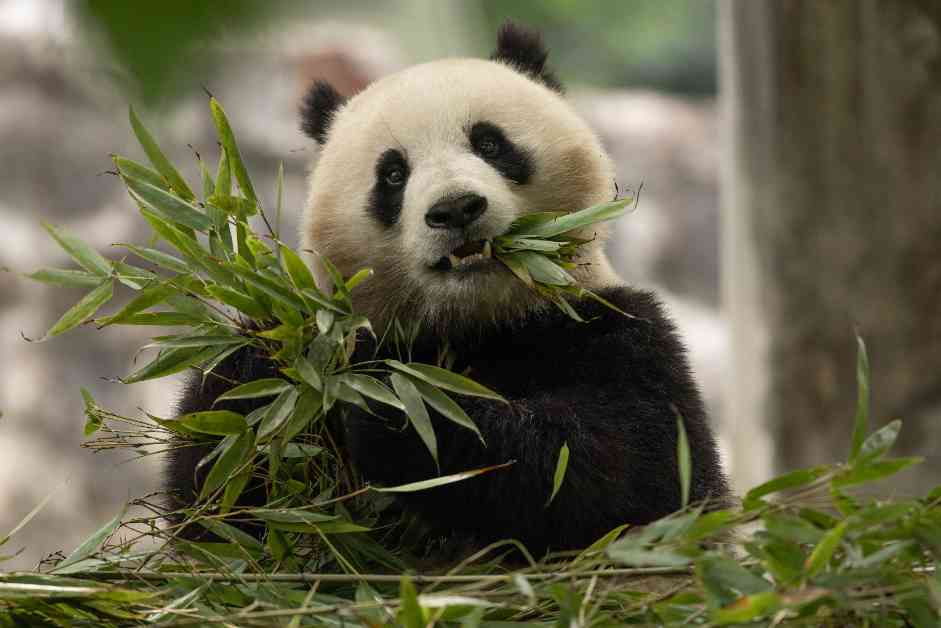China’s Newest Panda Diplomats Have Arrived in Washington D.C.
Two giant pandas, Bao Li and Qing Bao, have made their way from China to Washington’s National Zoo, marking the long-awaited return of these beloved bears to the American capital. The three-year-old pandas departed from the giant panda research base in Dujiangyan, near their native habitat in the mountains of southwest China, on Monday night local time. They boarded a specially chartered FedEx Boeing 777 cargo jet named the “Panda Express” early Tuesday morning and took off for Washington.
The China Wildlife Conservation Association made sure to prepare corn buns, bamboo shoots, carrots, water, and medicine to meet the pandas’ needs during the flight. This marks the first time China has sent pandas to Washington in 24 years, following the return of the previous pair to China last November. The anticipation is high at the National Zoo, which has recently completed a million-dollar revamp in preparation for the new panda arrivals.
The renewed panda diplomacy between China and the US comes as a positive development in the midst of strained relations between the two superpowers. Tensions over trade, technology, and geopolitics have marred their relationship in recent times. However, the arrival of Bao Li and Qing Bao signals a moment of collaboration and goodwill between the nations.
Before their departure from Dujiangyan, the pandas were loaded onto trucks in large transport crates, with CNN being the sole foreign media present to witness the event. Bao Li appeared calm and composed, while Qing Bao, the female panda, was more restless. Staff members waved photos and banners, chanting slogans for a safe journey as the trucks drove off.
A sendoff ceremony was held at a hotel near the base, attended by a delegation from the Washington Zoo who assisted in the transition process. The director of the zoo, Brandie Smith, highlighted the decades-long collaboration between the Smithsonian and its Chinese partners in panda conservation. Bao Li and Qing Bao have been loaned to the National Zoo for 10 years, with an annual fee of $1 million to support conservation efforts in China.
Born in Sichuan, Bao Li has a strong connection to Washington, with his mother and grandparents having lived at the National Zoo before. The panda keeper, Mariel Lally, noted that Bao Li resembles his grandfather Tian Tian and expressed excitement about welcoming the new pandas to the zoo.
Preparations for the pandas’ journey across the Pacific Ocean have been meticulous, with the bears placed in quarantine and trained for the long-haul flight. The keepers have ensured that Bao Li and Qing Bao are comfortable and well-fed during the trip. The crates are spacious, allowing the pandas to move around and relax during the flight.
The arrival of Bao Li and Qing Bao marks a new chapter in the National Zoo’s giant panda conservation program. These iconic black and white bears have captivated audiences in Washington and worldwide for decades. The zoo’s commitment to panda diplomacy reflects the power of partnerships and public support in achieving conservation goals.
Despite some concerns raised by a vocal group in China about sending pandas abroad, the collaboration on giant panda conservation remains a significant achievement. The China Conservation and Research Center for Giant Panda has addressed rumors about mistreatment of pandas at the Washington zoo, emphasizing the importance of international cooperation in protecting these national treasures.
As Bao Li and Qing Bao settle into their new home at the National Zoo, they symbolize the enduring friendship between the Chinese and American peoples. Their presence is not only a delight for visitors but also a reminder of the positive impact of conservation efforts and cross-cultural exchanges. The pandas’ return to Washington represents a beacon of hope and unity in a world often marked by division and discord.
